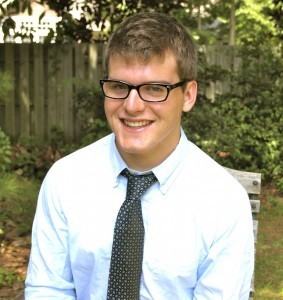Chris Stedman's Blog, page 28
March 6, 2012
Please Help us Help LGBT Youth in Crisis
Dear NPS readers,
As many of you know, it is not easy for LGBT youth to grow up in this world. Even in a country with as many resources as ours, LGBT youth face discrimination, bullying, and isolation — even from their own families. As a result, a disproportionate number end up homeless and without access to adequate support or resources. Discouraged, many of these young people head to places like LA in search of acceptance and assistance.
This weekend, I will accompany a group of Harvard Humanist graduate students to LA for our annual alternative spring break service trip. Once there, we'll spend a week working with several organizations that have dedicated themselves to serving LGBT youth in crisis. Among them are:
The Trevor Project
The LA Gay and Lesbian Center
Common Ground
LifeWorks
Safe Place for Youth
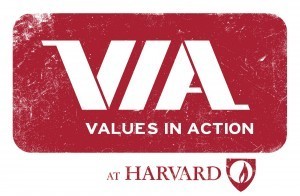 Our students are giving their spring break, as well as some of their own money, to participate in this program. If you can, please help us make this a successful trip by donating to support their efforts. Go to www.harvardhumanist.org and click on the button to "Support our Work." As you check out, specify that you want the funds to be used for the "Spring Break Service Trip."
Our students are giving their spring break, as well as some of their own money, to participate in this program. If you can, please help us make this a successful trip by donating to support their efforts. Go to www.harvardhumanist.org and click on the button to "Support our Work." As you check out, specify that you want the funds to be used for the "Spring Break Service Trip."
As a queer adult, this issue is extremely near to my heart. My hope is that this week will be an incredible experience for our group to both learn about the issues surrounding LGBT youth in crisis and to lend a hand in the important work these organizations do.
Whether you're able to financially support our efforts or not, I appreciate your time and consideration.
Best,
Chris
March 4, 2012
Talking Santorum, Secularism, and the 2012 Presidential Primaries on the Radio
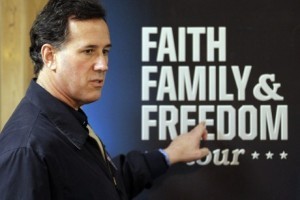 A few days ago, I had the privilege of making my third appearance on State of Belief radio (if you're curious, you can click here and here to check out my previous appearances). It aired yesterday, and now it's online!
A few days ago, I had the privilege of making my third appearance on State of Belief radio (if you're curious, you can click here and here to check out my previous appearances). It aired yesterday, and now it's online!
I always enjoy being on the show, and this time was no different (though I was all stuffed up with a terrible cold at the time, ha). To kick things off, host Welton Gaddy asked me what I thought about extremist language and religion in the 2012 Republican Presidential primaries. We ended up discussing how nonreligious folks are being dehumanized and used as a political wedge issue by Rick Santorum, Newt Gingrich and others, threats to the separation of church and state and Santorum's confusion about it, fear-mongering around Islam and sharia law, and more — as well as the overall relevance of these issues to the cultural divide between the religious and the nonreligious, atheist and Humanist communities, and interfaith work. And, as a bonus, he invited me to talk briefly about the alternative spring break trip I'm facilitating next week for our graduate students, to work with LGBT youth in crisis in Los Angeles. It's a relatively short segment, so click here* and give it a listen if you'd like!
Many thanks to the folks at State of Belief for inviting me on the show again!
*You can either listen to the full program, or just my segment. However, at the moment the segments appear to be mislabeled. Mine is entitled "Americans of no faith in the 2012 election," but it seems you need to play to the segment labeled "The Origins of the Language of War" to hear it.
March 2, 2012
Why This Atheist Still Needs His Former Pastor
 It felt good to pick my own pastor.
It felt good to pick my own pastor.
He was young–so much so that nearly everyone called him "Pastor Doogie" –gracious, eloquent and kind, with a biting sense of humor that showed he didn't take anything too seriously (besides the love of God). After meeting and working with him on a Teens Encounter Christ retreat, I loved Pastor Matthew so much that my friend and I decided to become members at his church.
For our first act as official church members, we participated in a "30 Hour Famine," raising money to give food to those in need and fasting for 30 hours so that we might intimately know the experience of hunger. The event also served as a church retreat where they screened The Passion of the Christ; to the shock of my tear-streaked friends, I fell asleep in the middle of it. That my response to a visual depiction of the crucifixion was to take a nap may have been a sign of things to come: just a couple of years later, I stopped believing in God.
Continue reading at RELEVANT Magazine or The Huffington Post.
February 23, 2012
Lent for Atheists
The following OpEd appeared originally as a guest column in the Yale Daily News. It has also been posted on
The Huffington Post.
I walked into Commons early yesterday morning and saw blue-gray smears dotting the foreheads of a handful of my classmates. I'm embarrassed to admit that I was strangely surprised. Of course, I knew that it was Ash Wednesday. I knew that the beads and colored drinks from last night's Feb Club party were to celebrate Mardi Gras — the last great celebration before the temperance of the Lenten season. But it still felt odd to see my classmates wear their religion so prominently on their foreheads. It was hard not to feel self-conscious on their behalf.
But I can't say that I didn't feel a little bit jealous, either. I've been an atheist since I was old enough to drive, and I don't find the stories in the Bible any more believable now than I did when I was 16. But atheists still miss out on a comfort provided by religion — not necessarily in the beliefs per se, but in the ritual of it all.
I love Christmas far more than I have any right to, and I'd guess that I love it for the exact same reasons most Christians love it: there's something really special about spending time with family, giving thoughtfully to those in need and those we care about and listening to nostalgic music while drinking hot cocoa by the fire with your cats (or dogs, or grandparents). I don't see why Christianity is necessary to enjoy any of that, and I refuse to let the faithful have all the fun.
So it bothers me when other atheists are too quick to do away with the beauty religion cultivates, as if it were necessary to toss the beauty out right along with the cosmology. I think we make a mistake when we fail to distinguish the form from the content of religion. Doing away with both is like smashing a glass because we don't like the drink inside it.
Depending on context, the exact same techniques can serve propaganda when used by fascists or public service announcements when used by our government. The form is all the same, of course. Good advertising is good advertising. But what matters is what the advertisements are about. Goebbels was an evil man, but he could sure sell a point. If we can use his talents for good, why not?
I see the practices of religion a lot like how I see advertising. If there's one thing religions have gotten down since the Agricultural Revolution, it's enriching the human experience through ritual. So why not borrow some of that, even if the content that currently fills it leaves something to be desired? Not that I'm comparing Christians to fascists.
Something along these lines is the premise of the writer and philosopher Alain de Botton's upcoming book, "Religion for Atheists." And while his ideas have been violently opposed by atheist bloggers (about as charming a group as you might expect), I actually find them pretty compelling.
So I was sitting in Commons yesterday looking around at all my classmates, and I began to think about Lent. Not about Jesus wandering through the desert for 40 days and 40 nights while being tempted by the devil, but about my Catholic friends' yearly test of willpower, sacrifice and self-improvement. I realized that was something worth doing on its own.
I decided then that I'd take part in Lent. I've been mostly a vegetarian for the last two years. But the reasons I object to eating beef and chicken apply equally to drinking milk and eating eggs: I don't necessarily object to consuming flesh per se, but rather how we treat livestock and how factory farming impacts the environment. So while I've been finding the transition from a vegetarian diet to a vegan diet particularly daunting, the Catholic Church provides me a perfect and relatively low pressure avenue for a brief period of self-improvement. I don't see any reason not to try it out.
Is picking and choosing religious rituals and practices a bit irreverent and patronizing? Probably a little. Is it a potentially great way to enrich secular life? Definitely. That's as good a reason to practice Lent as I can think of.
 Vlad Chituc is a senior at Yale University, studying Psychology and Philosophy with an interest in how we form beliefs (particularly moral and religious), and an interest in metaphysics and moral philosophy on the side. He has served as the Community Service Coordinator and President of the Secular Student Alliance at Yale (formerly the Yale Humanist Society), during which he participated in the Inter-Religious Leaders Council and worked closely with the Yale Chaplain's Office to foster relationships with liberal member s of the Yale religious community. In his spare time, Vlad enjoys listening to hipster bullshit and writing sarcastic articles and music reviews for the Yale Herald. If you want to read more of his writing, check out plaindamnfool.wordpress.com
Vlad Chituc is a senior at Yale University, studying Psychology and Philosophy with an interest in how we form beliefs (particularly moral and religious), and an interest in metaphysics and moral philosophy on the side. He has served as the Community Service Coordinator and President of the Secular Student Alliance at Yale (formerly the Yale Humanist Society), during which he participated in the Inter-Religious Leaders Council and worked closely with the Yale Chaplain's Office to foster relationships with liberal member s of the Yale religious community. In his spare time, Vlad enjoys listening to hipster bullshit and writing sarcastic articles and music reviews for the Yale Herald. If you want to read more of his writing, check out plaindamnfool.wordpress.com
February 15, 2012
Holier Than Who?: Why Atheists Must Work For Change Not Conversion
The following is a guest post by Andrew Tripp, a Philosophy and Art History student at DePaul University. He is the co-founder and President of the DePaul Alliance for Free Thought, the university's first and only group serving its population of nonreligious students. It was originally posted over at In Our Words: A Salon for Queers and Co.
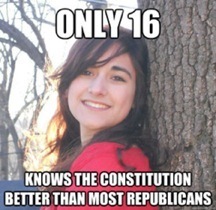 There has been much talk recently, on In Our Words and elsewhere, about the circumstance of being religious and yet also devoted to progressive activist causes that contravene the tenets of one's faith. Relatedly, I have also engaged in many conversations about "New Atheism" and how it should approach such people and activism in general. Unfortunately, in my view, many of those who I have encountered in such conversations believe that we should be essentially preaching atheism, looking to convert the religious as we without faith have so often been targeted for conversion to faith.
There has been much talk recently, on In Our Words and elsewhere, about the circumstance of being religious and yet also devoted to progressive activist causes that contravene the tenets of one's faith. Relatedly, I have also engaged in many conversations about "New Atheism" and how it should approach such people and activism in general. Unfortunately, in my view, many of those who I have encountered in such conversations believe that we should be essentially preaching atheism, looking to convert the religious as we without faith have so often been targeted for conversion to faith.
I believe this to be a position that is untenable if we as a secular movement are to truly do without the trappings of organized religion, so in this post I will examine these two phenomena in light of some recent developments in secular activism, and provide an alternative to such preaching that allows us as a movement to continue with a proactive, rather than domineering, message.
It is easy to forget in places like Chicago and New York and other more cosmopolitan areas of this nation that atheists stand as the most disliked and distrusted group of people in the United States of America: as Julian Baggini discovered on a recent journey around the country, it is one of the last big taboos existing in America. His piece documents numerous people who have been isolated by their friends and families for simply admitting their nonbelief. Our country's longest standing institution, bigotry, truly does extend to every group that is not white, male, rich, straight, and Christian.
One story that Baggini did not cover is, I think, one of the most important. Two years ago, a Rhode Island high school student named Jessica Ahlquist noticed that her public school, Cranston West, had an official school prayer emblazoned on a banner in their gymnasium. Such an exhibition is, of course, in violation of the First Amendment to the Constitution, and Ahlquist, an atheist, found herself feeling marginalized by it. She contacted the American Civil Liberties Union and the Freedom From Religion Foundation, and the former sent a letter to the school district asking the prayer to be removed, offering a fine explanation of the issue at hand:
Rhode Island, as a pluralistic state founded on religious freedom, should be particularly sensitive to the divisiveness of government-sponsored displays promoting religion. While students remain free to privately pray at appropriate times, prayer does not need, nor should it have, the guiding hand of government for its effectuation. No student should be forced to attend his or her public school only at the cost of being subject to a religious message that may run directly counter to his or her deeply-held beliefs.
Being such an open and shut case, one might think that the district would understand how in the wrong they were and take down the banner and have that be that, with no legal battle having to ensue. Ahlquist went and sat in at the school board meetings deliberating on the issue, and found that not just the board, but most of the town and her classmates were fighting for the banner to remain. In fact, when she spoke out against the banner, Ahlquist had to be escorted by police from the school due to the volume and seriousness of the abuse against her.
The abuse did not stop. She was threatened regularly at school, as well as in the community, especially so when the ACLU filed suit against the town. In the end, the ruling was granted in her favor, as expected, but since then she has continued to receive a sickening volume of threats, many violent in nature, and she has been given police escorts during and after school, and the police has deemed several serious enough that they are worth criminal investigation. Through it all, she has stood tall and spoken incredibly eloquently on behalf of herself and her cause, and is a credit to all activists dedicated to equality everywhere.
Jessica's story is sadly not unique. Damon Fowler had his entire town, including his parents, turn against him for speaking out against prayer in his school, to the point where his parents kicked him out of their house. Eric James Borges, a gay teen, recently committed suicide after his fundamentalist Christian family tried to perform an exorcism on him and made his life toxic and unbearable. There are far too many stories that follow this pattern.
Why am I writing about these events? To illuminate my belief that religion of this sort, so discriminatory and bigoted, so unthinkingly horrible, is near-fully enmeshed with American life, and that this needs to be stopped. There is no good to come from establishments of religion to have any role beyond the private lives of their adherents and in charitable causes. There is no reason for a religious organization to have any influence or involvement with matters of politics or public life, because it has never, to my knowledge, resulted in any good. It only results in the kind of awful sexist and patriarchal abuse of the sort suffered by Jessica Ahlquist, and other varieties of bigotry aside.
I say this with a very large caveat; I am not the sort of Dawkins/Harris/Hitchens atheist who believes religion needs to be destroyed, or cast away entirely. I am more than well aware of the good that can and has been done by more liberal sects. I stand behind them as much as I am able, so long as they would remain committed to such good works. As Patton Oswalt rather wonderfully details, I don't give a damn why or who with you are working for social justice and to make the world a more equal and fairer place, just so long as you are. Whether it's because you believe Jesus or Mohammed or Mahavira or Athena told you to or you just have rationally deduced that it is the right thing to do, it does not matter. Solidarity and collective effort are everything in the fight against the kind of intolerance that has dogged Jessica Ahlquist and the others mentioned.
In the end, though we can and must work with our friends of faith for equality, we cannot- as James Croft recently explored, end up maintaining religion's place of privilege in our society. At the end of the day, Christianity and Hinduism and all the rest are superstitious belief systems with no grounding in fact or rationality, and as such do not deserve any sort of privilege. But to the point I made before regarding converting people to atheism, we must not as secular people turn around and place rationality, empiricism or any of the various methods we use to examine the world on a pedestal. It happens; I encounter atheists who never question authors like Harris and Dawkins because they are The Most Rational, The Best Atheists, and so on. But do they have to be? Most of the mainstream atheist writers do not so much as mention activism or social justice issues as worthy pursuits, instead sticking to high-minded academic arenas such as historical instances of organized religion's awfulness, or scientific proofs against the Bible, and so on. These are extremely important areas to know and understand, but they do not relate us to the wider world at large. Sikivu Hutchinson, in her brilliant book Moral Combat: Black Atheists, Gender Politics, and the Values Wars, puts it best:
New Atheist discourse purports to be "beyond" all that meddlesome stuff. After all, science has been cleaned up to redress the atrocities of the past. The "bad" racist eugenicist science and scientists of back in the day have been purged. Religionists of all stripes are merely obstacles to achieving greater enlightenment in the generic name of science and reason. Race and gender hierarchies within the scientific establishment are immaterial when it comes to determining the overall thrust and urgency of the New Atheism. Non-believers who argue for a more nuanced approach to or progressive understanding of the political, social, and cultural appeal of religion are toady apologists.
Religious bigotry and discrimination are deemed the greatest threat to "civilized" Western societies. As delineated by many white non-believers the New Atheism preserves and reproduces the status quo of white supremacy in its arrogant insularity. In this universe, oppressed minorities are more imperiled by their own investment in organized religion than white supremacy. Liberation is not a matter of fighting against white racism, sexism and classism but of throwing off the shackles of superstition.
Thus, I come to my ultimate point: making an argument for atheism as a preaching movement, as one that actively seeks to convert, is wrapped up in the same hierarchical, holier-than-thou rhetoric that allows religions to go out and try to do the same thing. However, by working to remove religion from the institutions of the state, to eliminate their influence over politicians and those who hold power in our country, we can actually make progress in making the United States a more free and equal place.
We must work to secularize our government, not turn them all into atheists. The latter is simply not tenable, and ignores the good that religious motivation can do. Our worldview is no more privileged or better because we have the evidence and common sense on our side: what matters is how we act as citizens in the world. If we do not work for change, then we are no better than the religious fundamentalists we love to criticize.
Note: The opinions of this post do not necessarily reflect the positions of the membership of the DePaul Alliance for Free Thought.
 Andrew Tripp is a scoundrel, raconteur, and all around roguish individual who is studying Philosophy and Art History at DePaul University. He is the co-founder and President of the DePaul Alliance for Free Thought, the university's first and only group serving its population of nonreligious students. You can find him on a barstool cheering on Manchester City Football Club on the weekends, at his blog dreamingofqueens.blogspot.com and on Twitter @ahtripp.
Andrew Tripp is a scoundrel, raconteur, and all around roguish individual who is studying Philosophy and Art History at DePaul University. He is the co-founder and President of the DePaul Alliance for Free Thought, the university's first and only group serving its population of nonreligious students. You can find him on a barstool cheering on Manchester City Football Club on the weekends, at his blog dreamingofqueens.blogspot.com and on Twitter @ahtripp.
February 8, 2012
HUNGERally!
There's a question that often floats about when considering the problem of hunger: "Why us?" With the plight of starving African children so visible that it has become a platitude, and with reports of earthquakes in Haiti and tsunamis in the Indian Ocean devastating already impoverished homes and families– could Americans really be facing anything like their brothers and sisters elsewhere?
Yet, to say that the misfortunes of others overseas devalues those closer to us is absurd. It is certainly strategic to fight poverty where it is most seeded, but holding to practicality, we must sometimes focus our attention to domestic concerns. And so, we look on our own shores, and realize that hunger is anything but alien to this generation of Americans. Let's start with the men (and women) in the mirror, and "make that change".
Combating hunger has been, this past year, a theme of sorts driving interfaith action in and around Boston. To benefit children in Quincy, Mass., two separate events hosted by the Humanist Chaplaincy at Harvard and the Harvard Interfaith Council packaged over 30,000 meals with the help of Kidscare International. This Saturday, the effort continues, with HUNGERally, a interfaith presentation and discussion to educate the local population on hunger and homelessness in Boston and beyond.
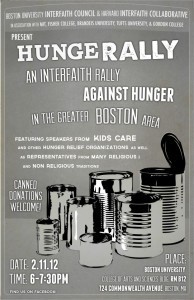 HUNGERally marks the first collaborative effort by Boston-area colleges to organize an interfaith service and dialogue project. Students and faculty from Harvard, Boston University, Brandeis, Boston College, MIT, Gordon College, Fisher College, and Tufts have worked together to organize a compelling series of speakers and exercises, including folks from various religious backgrounds speaking on why their tradition compels them to fight hunger.
HUNGERally marks the first collaborative effort by Boston-area colleges to organize an interfaith service and dialogue project. Students and faculty from Harvard, Boston University, Brandeis, Boston College, MIT, Gordon College, Fisher College, and Tufts have worked together to organize a compelling series of speakers and exercises, including folks from various religious backgrounds speaking on why their tradition compels them to fight hunger.
I'll be speaking from the Humanist perspective–and to give a short anecdotal introduction to what draws me to the cause, I remember a Friday night several months ago, just before one of Harvard's fall interfaith meal packaging projects. Chris Stedman, myself, and a fellow student leader Guillermo Hamlin were the only ones available to bring in the recently arrived ingredients for the next day's meal packaging, and despite the Friday night, despite the weight of the boxes, and despite the three flights of stairs, we persevered: carrying collectively over 2500lbs to the top-floor chaplaincy space. The experience resonated with me as an example of Humanist dedication to helping out those in need despite unforeseen and unfortunate circumstances, and I hope to find more opportunities to engage my values–put them in action, if you will–in the future.
And so, if you can make the time this Saturday, I'd hope you'd do the same. Take some time to reflect on what your tradition or philosophical perspective says about helping the unfortunate to you, and learn about what the face of poverty and starvation is in the Boston area. Abraham Lincoln asked that we "be sure to put [our] feet in the right place, then stand firm." This weekend, let's stand together, on the ground of shared values, and step forward in helping those in need.
HUNGERally
6:00 p.m., Saturday, February 11th
BU College of Arts and Sciences, Room B12
Facebook event: https://www.facebook.com/events/29363...
Walker Bristol is an undergraduate studying religion and linguistics at Tufts University, and the Community Organizer and Interfaith Representative for the Tufts Freethought Society. Originally from North Carolina, Walker was raised in a largely Quaker community before exploring several Christian traditions throughout high school and ultimately becoming a secular humanist at age 15. Walker serves as the chair of the Committee to Establish a Humanist Chaplaincy at Tufts, and has worked as a student intern at the Humanist Chaplaincy at Harvard. Along with fellow Tufts Freethought board member Lauren Rose, Walker hosts the internet radio show FreethoughtCast. In addition to being involved in secular student activism, Walker is a hobbyist musician, ballroom dancer, and far-too-avid science-fiction fan. He tweets nonsense @GodlessWalker.
February 6, 2012
Harvard's 2012 Interfaith Awareness Week Begins Tonight!
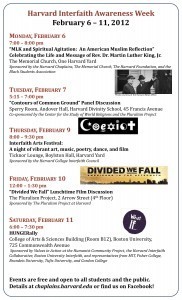 Hey friends! It's that time again: Harvard Interfaith Awareness Week.
Hey friends! It's that time again: Harvard Interfaith Awareness Week.
This year's truly excellent slate of events kicks off tonight with the annual celebration of the life and message of the Reverend Dr. Martin Luther King, Jr. Our speaker this year is the wonderful Rami Nashashibi, Executive Director of Inner-City Muslim Action Network (IMAN) in Chicago — an organization I've had the good fortune of working with in the past. IMAN does incredible work and I'm so excited to see Rami speak tonight.
Tomorrow, the Pluralism Project and the Center for the Study of World Religions are co-hosting a panel on the concept of common ground in interfaith work, featuring Francis X Clooney, Whittney Barth, Dr. Jenny Peace, Latifa Ali, and Chris Stedman (the first four panelists are great folks who do important work, but I'm not so sure about that last one). Also, if the panelists and/or topic don't entice you, there will be free food! Check out the Facebook event for more information.
On Thursday there will be an interfaith arts festival put on by the awesome student leaders of the Harvard Interfaith Council, and on Friday the Pluralism Project is hosting a screening of my good friend Valarie Kaur's brilliant film Divided We Fall. You can find more info on both of these events here.
Capping off the week on Saturday will be HUNGERally, the first ever attempt to bring together interfaith efforts on college and university campuses across Boston. I've been working with Boston University, Boston College, MIT, Fisher College, Brandeis University, Tufts University, and Gordon College to plan this event, which will be a canned food drive and a rally against hunger featuring hunger-relief activists and community leaders, as well as students representing a wide range of religious and non-religious perspectives. I'm co-emceeing this event, and would love to see you there! Click here for more information.
Click here for a full listing of the week's amazing line-up of events. Hope to see you at one (or all!) of these programs.

